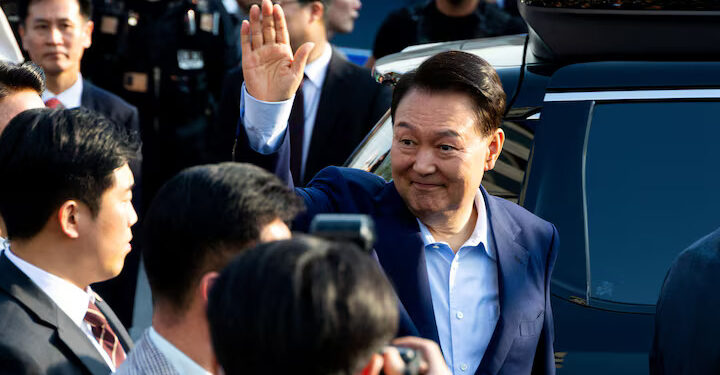The criminal trial of South Korea’s ousted president, Yoon Suk Yeol, commenced on Monday, with prosecutors alleging he orchestrated an insurrection by declaring martial law late last year, a move that triggered months of nationwide unrest.
Yoon justified the controversial declaration as necessary to eliminate “anti-state” threats.
However, it was swiftly overturned just six hours later when parliamentary staff repelled special operations forces attempting to storm the National Assembly.
Using barricades and fire extinguishers, they thwarted the troops, allowing lawmakers to formally reject the martial law decree.
Attempt to Thwart ‘Legislative Dictatorship’
Clad in a dark navy suit, Yoon arrived at the Seoul Central District Court in a motorcade from his residence, maintaining his innocence on all charges.
Prosecutors, opening the trial, contended that Yoon had no constitutional authority to impose martial law. They accused him of attempting to destabilize vital institutions, including parliament.
In his defense, Yoon argued that his decision was not aimed at crippling the government. Instead, he claimed it was necessary to confront what he termed a “legislative dictatorship,” accusing the opposition majority of persistently blocking his administration’s legislative goals.
The former president faces an insurrection charge, which under South Korean law carries a possible life sentence or even the death penalty, though executions have not been carried out for decades.
Earlier this month, the Constitutional Court officially removed Yoon from office, stating that his actions amounted to “a serious challenge to democracy.”
According to the court, his sudden martial law decree on December 3 shocked the nation and sparked widespread disruption across political, economic, and diplomatic sectors.
The incident has deepened the divide between South Korea’s conservatives and liberals, placing immense strain on state institutions and the military, which was uncertain about how to respond to the unprecedented order.
On Friday, Yoon vacated the presidential residence and returned to his private home, welcomed by throngs of conservative supporters.
Unyielding in his stance, Yoon vowed to “stand by” those who continue to support him. Meanwhile, the opposition Democratic Party blasted him as delusional, criticizing his refusal to issue a genuine apology.
Eyes on Snap Elections
With snap elections scheduled for June 3, speculation continues over whether Yoon could attempt a political comeback.
Leading presidential contender and opposition figure, Lee Jae-myung, on Monday toured an AI chip start-up, promising deregulation and aggressive investment in South Korea’s growing tech sector.
Monday’s hearing is expected to feature testimony from two senior military officials. Among them is Cho Sung-hyun of the army’s capital defense command, who previously told the Constitutional Court that he had received orders to dispatch troops to physically remove lawmakers from the National Assembly.
Yoon has rejected that claim.













